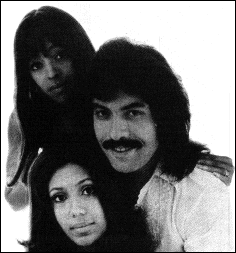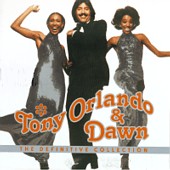|
In 1960, Aldon Music owner Don Kirshner hired young Tony as a demo singer for a then-unknown composer named Carole King. "I worked with her for seven months," Tony recalled. "On my first demo session, I cut 'Will You Love Me Tomorrow?,' 'Take Good Care of My Baby,' and 'Halfway to Paradise.'" The latter song, released as a single, became Tony's first hit in 1961. His next record, "Bless You," did even better, and Tony was, overnight, a teen pop star. He did live dates, appeared on "American Bandstand," and then vanished. The hits had ended as quickly as they had begun. In the fall of 1963, Tony joined April-Blackwood Music, and by 1970 he had risen to the rank of general professional manager. It was then that Dave Appell and Hank Medress walked into his office with a demo they'd produced called "Candida." Tony tried to place the song with Bell Records, but it was rejected, with a note that the lead vocal was too weak. Dave and Hank asked Tony to re-record the song himself, in the style he had used while working for Carole King. "Fellows, I don't do demos anymore," Tony objected, but finally he agreed. April-Blackwood approved as well, as long as Tony did not take label credit. Instead, Hank used the name Dawn, which was the name of their production manager's daughter. After the recording, Dave and Hank dubbed in the voices of two background singers, Telma Hopkins and Joyce Vincent Wilson, long time friends who had sung together anonymously on hundreds of sessions since 1964 (it was Telma, for instance, who told Isaac Hayes to "shut your mouth" on "Shaft").
Eight weeks later, "Candida" was a smash. (Tony couldn't remember the name of the song; his secretary had to look it up for him.) Calls began to come in from people hoping t book "that hot new 'Candida' group." But there was no Dawn -- in fact, Tony and the girls had not even met. To fill the void, over a dozen fake Dawns began to pop up everywhere. Bell whipped out $100,000, begging Tony to sign with them. Reluctantly, he agreed. Later, the $100,000 was spent suing the imposter groups and establishing the real identity of Dawn.
"Knock Three Times" was released in November 1970 and within a month had sold its first million. The record reached number one in January 1971 and went on to sell ore than seven million copies worldwide. As with "Candida," Tony and the girls recorded their parts separately -- he in New York and they in Los Angeles. The three still did not meet until after they had sold nine million records. The success of Dawn was "overwhelming," Tony told the press. "You say, 'Well, that ain't never going to happen to me -- no way! 'Course, if I ever had the chance I might... but what am I even thinking about it for?' And then, boom! Fantasy becomes reality! I think some fantasies should stay fantasies, because they're really much nicer that way. But in this case -- thank the good Lord -- everything turned out to be everything I imagined it to be." Dawn's biggest hit, "Tie a Yellow Ribbon Round the Ole Oak Tree", followed in 1973, and the trio charted three more Top 10 hits in the mid-seventies. After that, their hits stopped, though they still had many concert dates and a musical variety television series that ran intermittently for two and a half years on CBS. In July 1977, during a show in Massachusetts, Tony shocked Dawn and the audience by announcing his retirement and claiming he was giving up show business for Jesus Christ. His decision followed the death of his sister and suicide of his close friend, Freddie Prinze. He also had a cocaine problem and suffered from manic depression. In November of the same year, he made a solo comeback, playing Las Vegas and had a minor hit, "Sweets for My Sweet," on Casablanca Records. Beginning in the late eighties, Tony cohosted Jerry Lewis' Labor Day Telethon and in 1988 he briefly re-formed Dawn with Telma and Joyce. In the early nineties Tony relocated to Branson, Missouri, where he opened the Tony Orlando Ribbon Music Theater and began performing there regularly.
No comments so far, be the first to comment. |


